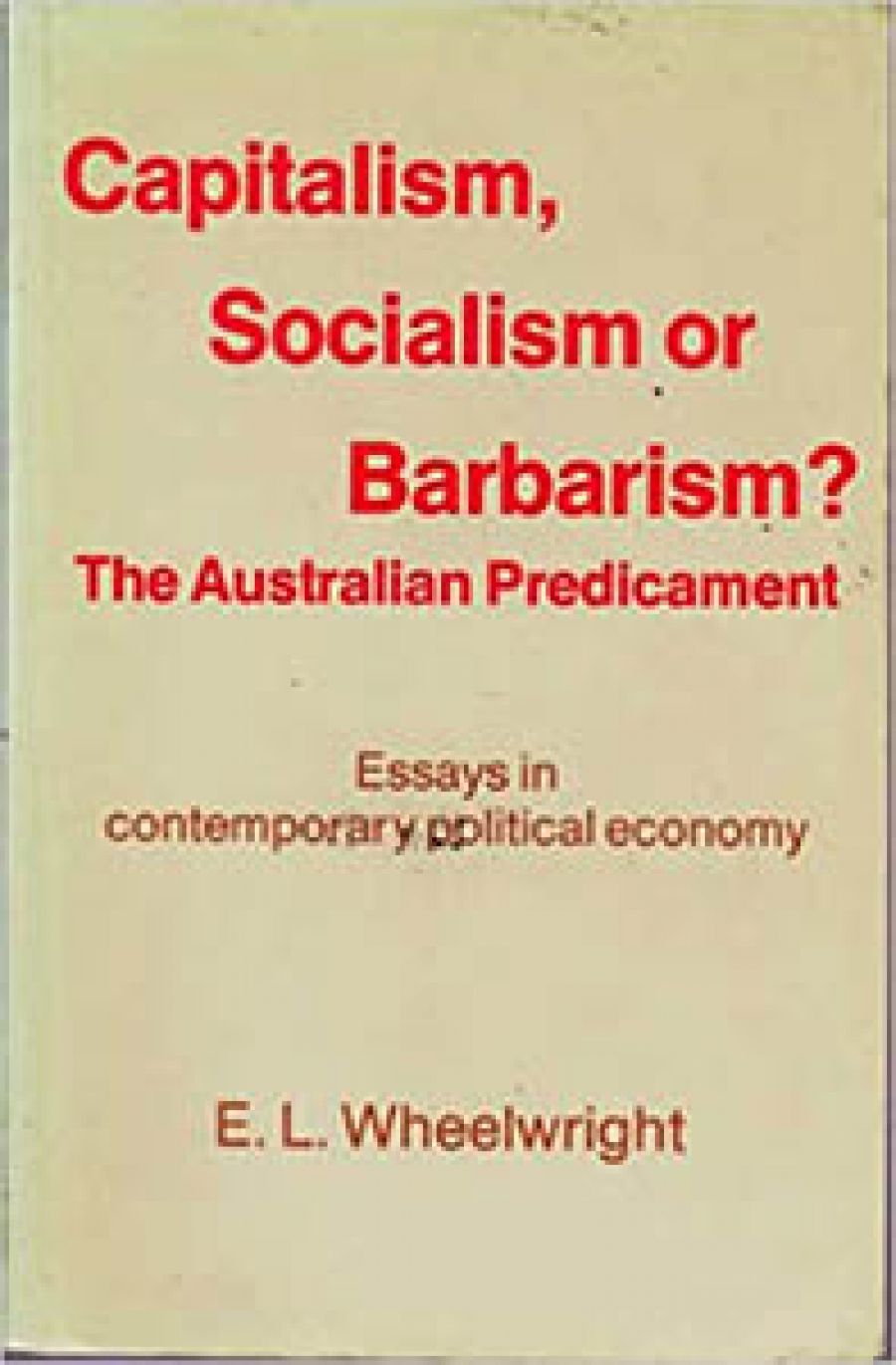
- Free Article: No
- Contents Category: Politics
- Review Article: Yes
- Article Title: Where Economists Fail
- Online Only: No
- Custom Highlight Text:
Central to this collection of essays by Ted Wheelwright is the argument that orthodox economics is a positive hindrance to any real understanding of the problems of the last quarter of the twentieth century. A rebirth of the political economy is necessary to remove the stench (from the corpse of orthodox economics) that is polluting the social sciences.
Now, it is certainly true that orthodox economics (that is the economics taught in ninety-nine per cent of our Universities, practised by Treasuries around Australia and spiritual descendant of Adam Smith, sometimes modified by Keynes) casts little light on some of the most acute problems of our era – the coexistence of unemployment and inflation, the (Mal) distribution of income between classes, the persistence of poverty, the power of the multi-nationals, etc.
- Book 1 Title: Capitalism, Socialism or Barbarism? The Australian Predicament
- Book 1 Subtitle: Essays on contemporary political economy
- Book 1 Biblio: ANZ Book Co., $12.95 pb, 207 pp
But how adequate is the political economy framework with which radical economists seek to replace the conventional wisdoms that have allegedly led us all astray? Is political economy more than the currently fashionable preoccupation of radicals? Does Wheelright provide useful insights into the ‘Australian predicament?’ It was Galbraith who told us that the gravest defect of orthodox economics is that power has been removed from the subject, in order to prevent the subject being what it is –political. In its attempt to be non-political, orthodox economics destroys its realization of the real world.
The first virtue of Wheelwright’s book is in correct mg that deficiency of which Galbraith was complaining. The politics have been put back into economics and we are taken through many chapters of lucid argument on diverse themes -structural unemployment; resource shortages and the myopia of economists obsessed with Gross National Product as the only indicator of a society’s growth, wealth and wellbeing, trade union education and the quality of life and work; financial scandals; the political as well as economic power or multi-nationals, and so on. These essays occupy about a third of the book’s contents and provide a most useful introduction for new students to the tools of discourse of political economy. As such it will be a most useful addition to reading lists for the (few) political economy courses being taught around Australia.
The second virtue of this collection lies in what it has to say more specifically about the Australian situation. Not surprisingly Wheelwright, who pioneered research into the ownership and control of Australian industry some twenty years ago, is preoccupied with the impact of multi-national corporations and foreign ownership on the Australian economy. He argues that those two forces are exerting pressure for further integration into the capitalist world economy, on the basis of expanding the supply of minerals and fuels, increasing manufactured imports, and turning Australia into a ‘service’ economy, with inbuilt, permanent, high unemployment. The chief sufferers in this developing situation are, and will continue to be, those with least bargaining power, the unskilled in general, but especially Aborigines, migrants, women and young people. Further integration into the world capitalist system (for the benefit of multi nationals), makes it increasingly difficult for any Australian government to control the economy as a whole and especially the resource-rich states, in our federal system. New regional inequalities are already being generated. South Australia, Tasmania and New South Wales each have different but acute unemployment problems. The resource-rich regions of the north will improve their positions at the expense of the south-east sector where employment in manufacturing industry will continue to fall.
The implications for policy in this analysis are that it is going to be more difficult than ever before to manipulate the economy to achieve Labor’s objectives. ‘This is especially true of full employment with stable prices.’ Wheelwright argues that the Fraser government’s policies of public sector spending cutbacks and ‘the new federalism’ are in the interests of the trans-national corporations who now dominate our economy at the end of the long post-war boom and ‘now feel that they no longer need state protection and nurturing and can run the capitalist system belier without government influence.’ Hence the popularity of the ideologies of Milton Friedman and Ayn Rand with the Fraser government.
If the right to work is to become a reality, Wheelwright argues, the mixed economy must become more mixed – with a higher proportion of public enterprise.
All the people who have nothing to sell in the market place but their labor must be warned that in the Age of Uncertainty which now confronts us, the present so-called mixed capitalist economy cannot generate sufficient demand for their labor, cannot generate a livelihood for them, unless there is a shift towards productive employment in the public sector. Only labor can engineer this.
Having discussed the two main virtues of this book at such length I can only mention in passing its two main weaknesses. The first is what I regard as unduly sympathetic few chapters on Chinese political and economic developments (particularly comments on the Great Leap Forward and The Cultural Revolution.) The second is the title. All the best books have two or three word titles: (War and Peace, Das Capital etc.) This one has twelve, and is still somewhat misleading.
But that is carping. The fact remains that Wheelwright is one of the few constructive thinkers we have in Australia about the nature of our society and the directions in which it is leading, and this collection of his essays is a useful contribution to that debate.


Comments powered by CComment